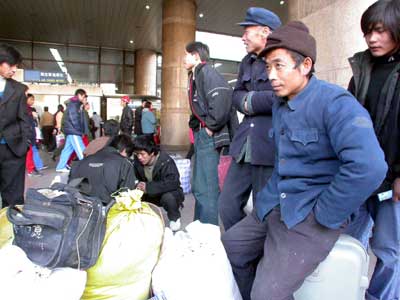|
Urbanization exhibits Chinese characteristics
By Han Qi (China Daily)
Updated: 2005-11-03 06:04

The progress of China's urbanization drive is inevitably interwoven with the
farmer exodus. Without farmers moving to settle in the cities, the rural
population will not significantly decrease and the urbanization drive will
suffer setbacks.
China's urbanization process is providing a historical
opportunity for the rural population to decrease. About 100 million farmers are
now working in the cities.
This is in line with the law of economics that states that as a
country's industrialization pushes forwards, rural labour migrates to urban
areas.
An often neglected fact, however, is that farmers coming to the cities to
work is starkly different in nature to the notion of the urbanization of the
rural population. In China, while a large number of farmers go to the cities to
work every year, many farmers-turned-workers also return to their homes.
The real meaning of urbanization is farmers settling down in cities. Their
links to the land will ultimately be severed and they will become an integral
part of urban communities. Only in this way can the rural population decrease,
therefore increasing the urbanization rate.
Actually only a small number of farmers who move to the cities finally settle
down due to various restraints.

Migrant workers
await trains outside a trian station. They leave for cities in the hope to
gain a better life. [newsphoto] |
Some shrewd and entrepreneurial people with relatively good educational
backgrounds may launch their own businesses or become high-calibre professionals
and managers in various sectors. Such rural people may well settle down in the
cities.
Another group of farmers in the cities have some skills or a small amount of
capital that ensures they earn a relatively high income compared to ordinary
industrial workers. As they can afford the basic living costs of an urban
family, it is also possible they will choose to stay permanently.
They are just like first-generation migrants from developing countries moving
to developed nations.
The majority of farmers working in the cities do not
stay long. They generally work in the manufacturing, building, mining or
catering industry. The work they engage in is often what urban residents refuse
to do because it is so strenuous or badly paid.
Many farmers-turned-workers are not covered by the
social security system or labour insurance. As they become older, they may lose
their job and have to return to their rural home.
China's case is different to that of many other countries, where it has been
easier for poor farmers to settle down in the cities although their living
conditions are unbearably bad. Therefore, the majority of Chinese farmers
working in urban areas are not "urbanized" although statisticians include them
in the overall urban populations. They are like migratory birds flying back home
during Spring Festival, a traditional time for family reunion.
We used to accuse the urban permanent residence system of blocking the free
flow of farmers to the cities. Now it is clear their inability to survive and
settle in the cities, where living standards are high, is the main reason for
returning.
China's urbanization requires farmers to move to cities and settle down.
Currently it is a mission impossible for most of them. This means China's
urbanization target may not be met as planned.
The government predicted in a report it submitted to the United Nations in
1996 that by 2010 its urban population would reach 630 million and its
urbanization rate would rise to 45 per cent from the current 40.5 per cent.
Since there are various economic and social restraints on farmers preventing
them from settling in the cities, it will be hard for China to accomplish its
goal.
The cities' ability to accommodate farmers will decide how fast China's
urbanization process will be. This will in turn be decided by the pace of
economic growth. Once economic growth slows, the pace of urbanization will be
affected.
Therefore, the rural population of China will not decrease substantially in
the coming years as in other countries when they industrialized. China may take
longer than expected to achieve its goal of high-level urbanization.
The short-term nature of many farmers' stays in urban areas will affect the
expansion of the urban industrial product market. Farmers that leave the cities
take away technology and skills.
This factor will also contribute to the widening rural-urban gap because
farmers-turned-workers spend the best years of their lives contributing to the
cities while they leave their unproductive years to be supported by their rural
home towns.
Of course, the migration of farmers has its positive side. In other
countries, urbanization has seen rural populations depleted as young labourers
move out and settle in the cities. In China, this process will be very slow as
farmers will continue to return to their homes after staying in the cities for a
few years.
Farmers who are trained in the cities bring with them money, skills and
experience gained from their periods of urban employment. They may use their
assets to launch businesses or help push on their local economy. Such progress
will predictably be slow, but it will happen.
Eventually, there may emerge a large number of prosperous small towns in
rural areas, which will demonstrate the progress of China's urbanization
process.
The author is a researcher at the School of International Trade and
Economics, the University of International Business and Economics
(China Daily 11/03/2005 page4)
|